CHHSM Member Organizations Find Creative Ways to Serve During Coronavirus Outbreak
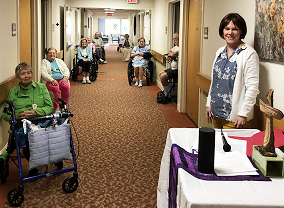
The Rev. Susan Roddey, spiritual director at Abernethy Laurels in Newton, N.C., leads hallway worship.
From phone calls, online chats and social media postings to Zoom, Skype, and Facebook video gatherings, CHHSM members are adapting to almost daily changes in health care requirements while serving their residents and clients.
“The world changes overnight,” says Chris Cox, president and CEO of Hoyleton Youth & Family Services in Fairview Heights, Ill. “Plans put in place by 6 p.m. have to be scuttled and rethought the next morning.”
The CDC-led changing rules for contact and screening in CHHSM agencies mean creative approaches to their ministries, approaches geared not only to protecting clients, but staff as well. CHHSM organizations across the country are currently closed to visitors, though outreach services continue.
Youth Services Staff Keep Activity and Educational Services Going
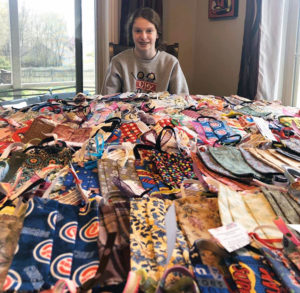
Volunteer Jenna Roos displays the 180 masks she is sending to Crossroad Child and Family Services.
At Bethany Children’s Home in Womelsdorf, Pa., the children and youth are taking part in virtual classroom education for several hours each day. Inter-cottage events that violate social distancing practices can’t happen right now, says Dana L. Hoffman, marketing and events specialist, but in-cottage events, and outdoor activities are scheduled to help the residents stay engaged.
For Crossroad Child & Family Services in Fort Wayne, Ind., virtual engagement has served as a solution to many resident needs. “Community-based services are being delivered virtually by Skype, Zoom, or telephone whenever possible,” says Kyle Zanker, chief development officer. “Face-to-face outpatient counseling has been suspended: instead, we are delivering tele-counseling.”
Crossroad staff also are finding ways to keep residential children busy through virtual field trips, games, creative time, Godly Play (faith exploration) and making cards for a local older adult community.
Zanker says Crossroad also works to ensure staff safety. “All staff not involved in direct client care or service delivery are working from home,” she says. “We are providing daily procedure changes to staff [and] all meetings are now being conducted through video conferencing.”
At Hoyleton, Cox has instituted additional pay for direct care staff, which he hopes to maintain throughout the “shelter at home” mandate. Hoyleton also is using technology to assuage the anxiety not only of foster and residential clients, but also of staff. “It relieves anxiety when people believe they are being heard and listened to,” he says.
Older Adult Communities Find New Ways to Meet Needs
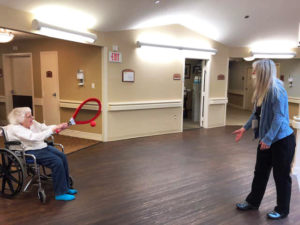
Indoor badminton is the order of the day at Piedmont Crossing.
United Church Homes and Services, based in Newton, N.C., is finding many ways to keep residents connected and active. In addition to using technology to help residents stay in touch with family members, they have modified traditional activities. Highlights now include playing bingo in doorways, and sending ice-cream trucks (golf carts) down hallways to deliver treats to residents. Residents also are sending thank-you notes to local childcare centers, thanking the employees for their dedication.
“If it weren’t for childcare centers remaining open and being flexible, then many staff might be unable to work,” says Lee Syria, president and CEO. “Residents are sending thank you notes and having a local restaurant cater food for childcare workers” to say thank you.
Syria says one of the most difficult tasks is keeping residents’ spirits up over time. “Regardless of technology, residents miss the physical presence of their loved ones,” she says. Many residents miss the regular interaction with other residents and such amenities as the hair salon. Staff are adapting tasks to help residents stay positive.
The importance of staff is not overlooked, either. “For key staff, we instigated a ‘Grateful Chain,’ and each week, they receive an ‘atta-boy’ from someone through emails, calls, texts, car tags, notes, or cards,” Syria says.
For United Church Homes (UCH), based in Marion, Ohio, staff in its communities do everything from keeping residents hydrated to helping them use communication technology and devising unique activities. For example, some of the communities experience sing-alongs via strolling guitar-playing staff members.
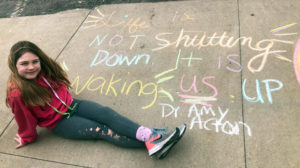
Lilly, granddaughter of UCH director of nursing Karen Webb and Mike Webb, who offers audiology services at UCH Fairhaven, used sidewalk art to cheer the residents.
On St. Patrick’s Day, residents of Harmar Place in Marietta, Ohio, wrote answers on poster board finishing the phrase, “I am lucky to have …” Staff took photos and sent them to family members.
“Right now, we’re living in unprecedented times when we can’t be physically together,” says Amy Kotterman, UCH director of hospitality. “Yet it’s important to know we are still in ‘community’ with one another.”
At Fairhaven Community in Upper Sandusky, Ohio, worship is experienced on the “Chapel Channel,” which is broadcast into resident apartments. Chapel Hill Community in Canal Fulton, Ohio uses the Eversound headphone system for residents who are hard of hearing to hold bingo and other games. “This has allowed UCH communities to continue programming for residents who need to socialize more amid a time of physical distancing,” says Kotterman.
Fairhaven Senior Services in Whitewater, Wis., has responded to the need to keep up the spirits of older adult residents via video concerts and shows. Brian Robinson, leisure services director, and Tim Probst, marketing and community relations director, “walk the independent living hallways on Tuesdays and Thursdays, ringing a bell, and handing out treats: ice cream, popcorn, nachos,” says Probst. “We all try to be engaging and monitor residents status.”
With “Stay at Home” orders, groceries are a problem, Probst adds. So a shopping service has been instituted. “Apartment residents can order groceries daily,” he says. “We shop and deliver to their rooms.” Family members can also drop off groceries, laundry or packages, and staff delivers the care packages.
“Our residents and staff have really stepped up,” says Paul Kuenning, president and CEO. “Cooperation has been excellent. We started the restriction process earlier than most other entities in our community — which meant we were ahead of the curve, but when people were just beginning to adjust to the seriousness of the matter.”
Residential and Outreach Ministries Called to Serve
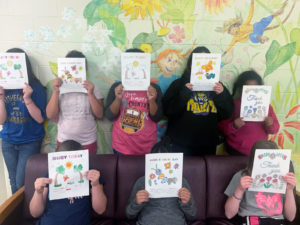
The young women at Susan’s Cottage at Brooklawn in Louisville, Ky., say thanks by creating art to send to local first responders.
For Abby Drane, president and CEO of Seven Counties Services and Bellewood & Brooklawn based in Louisville, Ky., the challenge is serving 150 residential children and teens while also providing community services to more than 30,000 “neighbors and friends living with the effects of mental illness, addictions, and intellectual and development disabilities.”
At Bellewood & Brooklawn, staff has structured time so that the children and youth — many already behind academically when they arrive — have designated on-site classroom times while practicing social distancing.
“We’re doing everything we can to shield our kids from the deluge of outbreak news in an effort to mitigate the risk of greater anxiety being created,” Drane says. With regular meetings and activities curtailed, “the kids rely on their cottage mates as their inner circle.”
Telecommunication has helped as well, Drane adds. “One of our youth was participating in weekly passes with his mom and dad,” she says. “Now that they’ve been suspended, he has been video chatting. We were able to use Zoom [one evening] and he joined for a family dinner.”
Another youth was recently introduced to a foster parent. “They are using Zoom to help the youth build a character so he is ready to join in the family game of Dungeons and Dragons” when he is able to visit, Drane says.
Drane’s Seven Counties Services team also has adjusted to offering services via telehealth and telephonic therapy. “We’re also the only personal connection for many of our vulnerable, homeless citizens,” she says, “and so we’re partnering with other community providers to make sure no one falls through the cracks.”
Like Seven Counties Services, United Church Outreach Ministry in Wyoming, Mich., serves many neighbors in its community. “To protect our neighbors, our staff and volunteers, we introduced procedures to continue to provide access to good food while practicing common sense recommended measures for physical distancing,” says Bruce Roller, executive director.
Staff answering phone requests for assistance provide information in a sensitive and pastoral way. Food packages are brought out to clients’ cars.
For example, says Roller, “Donna’s family is brand new to UCOM’s Healthy Choice Pantry,” says Roller. “She picked up a ‘take-out order’ last week, and called back as soon as she got home to thank the staff.” The care package included a week’s supply of groceries, including fresh produce, as well as the board game “Sorry.” Not only was Donna able to feed her family nutritious food, but “thanks to you, I spent most of the afternoon playing ‘Sorry’ with my kids,” she told UCOM staff.
The Rev. Donna Smith-Pupillo, executive director of Deaconess Nurse Ministry (DNM) in St. Louis, shepherds nurses across several CHHSM-related agencies and community organizations. Nurses at CHHSM member St. Andrews Resources for Seniors System do temperature checks and monitor the health of the residents. At Every Child’s Hope, the DNM nurses check in on the children and staff. Deaconess Nurse Ministry also makes wellness check calls for the City of St. Louis, logging more than 300 calls a week.
Additionally, DNM nurses and doctors of the Muslim Community of St. Louis are keeping the Salam free clinics located across the city open. “We do screening at the door, and only let in one client at a time,” says Smith-Pupillo. “For many folks who come to the clinics, we serve as their primary care, and the physicians want to stay open as long as they can to help serve those who need care.”
Such stories are visible in CHHSM organizations across the country. And as CHHSM members continue to serve, they also are grateful for the ongoing monetary contributions that are helping them meet the increased costs associated with providing for their residents’ and clients’ needs.
“The United Church of Christ and CHHSM have always been the community that wrapped their arms around our most vulnerable,” says Drane, who in addition to being a Nollau Leadership Institute graduate and Diakonal Minister also serves as CHHSM board chair. “Now more than ever, we call on our faith partners, volunteers and donors to lift our organizations and clients up in prayer and service.”
The members and organizations of CHHSM and the wider UCC are the keys, says Hoyleton’s Cox, who adds, “The UCC needs to stand together and make known that we are the church on the ground.
“This is the time when our UCC partners will stand up in their communities and lead. This is what we as the church are called to do.”
Find the latest information and resources on responding to COVID-19 on our Coronovirus Resources page.
Join Our Mailing LIst
"*" indicates required fields
Follow on Facebook
Pension Boards appoints David A. Klassen as its President, CEO - United Church of Christ
www.ucc.org
The Pension Boards, an affiliated ministry of the United Church of Christ recently announced its appointment of David A. Klassen as its next President and